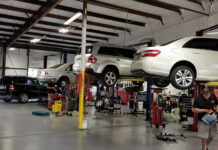Are you tired of struggling with car maintenance in cramped spaces? The solution to your problems might just be an auto lift! Whether you’re a DIY enthusiast or a professional mechanic, investing in a car lift can revolutionize the way you work on vehicles. Imagine the ease of having a reliable automotive lift that not only saves you time but also ensures your safety while working underneath cars. But wait, what are the different types of car lifts available, and how do you choose the right one? With so many options like 2-post lifts, 4-post lifts, and even scissor lifts, it’s easy to get overwhelmed. But don’t worry! In this blog post, we’ll explore the advantages of using an auto lift car lift, uncovering the best practices for selecting the ideal model for your needs. Are you ready to elevate your home garage experience and take your vehicle repairs to the next level? Dive in with us as we uncover the secrets to a more efficient, safer, and enjoyable automotive workspace!
Top 5 Reasons Why an Auto Lift Car Lift is Essential for Every Modern Garage
If you’ve ever been under a car, maybe you’ve thought, “Gee, I wish I had an auto lift car lift right about now.” Well, welcome to the world of auto lifts, where lifting your vehicle isn’t just a fantasy but a reality! It’s like magic, but you know, with metal and hydraulics.
Now, there’s a bunch of different types of auto lift car lifts out there, and honestly, it’s kinda hard to figure out which one is the best fit for you. Like, do you really need a two-post lift, or can you get away with a four-post lift? Not really sure why this matters, but it does seem to be a big deal for some folks. Let’s break it down in a way that hopefully makes sense (or doesn’t, who knows?).
Types of Auto Lifts
Two-Post Lifts: These are the classic, the OG of the lifting world. They’re usually cheaper and take up less room, but you gotta be careful about the weight distribution. I mean, it’s all fun and games until the car comes crashing down, right?
Four-Post Lifts: These guys are like the luxury models. They hold more weight and are super stable. But hey, you might need a bit more space because they take up more room. If you’re planning on doing some serious work on your car, maybe this is the way to go.
Scissor Lifts: If you’re short on space, these might be for you. They go up and down without needing much room, which is cool. But, be warned, they don’t usually lift as high as the others. So, if you’re planning to do some undercarriage work, you might feel a little cramped.
Portable Lifts: These are like the nomads of the lifting world. Super handy if you’re a garage warrior on the go. They can be moved around easily, but keep in mind, they’re not always as sturdy as the fixed lifts. So, use them at your own risk, I guess?
Why Do You Need an Auto Lift?
Well, maybe it’s just me, but I feel like having an auto lift car lift is a game-changer. For starters, it saves you from crawling around on the ground, which, let’s be honest, is not the most glamorous thing to do. Plus, if you’re working on your car, you can actually see what you’re doing! Who would’ve thought, right?
And if you’re a professional mechanic or run a garage, having a lift is like having a secret weapon. It makes everything faster and more efficient. You can pop a car up in seconds, do your thing, and then boom, it’s back on the road.
Choosing the Right Auto Lift
When you’re looking to buy one of those auto lift car lifts, there’s a few things you gotta consider. Like:
- Weight Capacity: Don’t skimp on this. Make sure it can handle whatever you’re planning to lift. No one wants a dramatic “oops” moment when a car falls!
- Space: Measure your garage before you buy. You don’t want to end up with a lift that’s too big for your space. It’s like trying to fit an elephant in a phone booth. Not gonna happen!
- Budget: Lifts can range from a few hundred bucks to several thousand. Set a budget before you get too attached to a model. Trust me, you don’t want to be heartbroken over a lift you can’t afford.
- Features: Some lifts come with extra features like rolling jacks or drip trays. Decide what’s important to you.
Practical Insights
Here’s a little table to help you compare different types of lifts:
| Type | Weight Capacity | Space Required | Price Range |
|---|---|---|---|
| Two-Post | Up to 12,000 lbs | Moderate | $2,000 – $4,000 |
| Four-Post | Up to 14,000 lbs | High | $3,000 – $8,000 |
| Scissor | Up to 6,000 lbs | Low | $1,500 – $3,500 |
| Portable | Up to 3,000 lbs | Very Low | $800 – $2,000 |
Common Misconceptions
A lot of people think that auto lift car lifts are only for professionals. But that’s just plain wrong! Anyone can use one, as long as you read the instructions (duh). Also, some folks might believe that lifts are too complicated to operate. Seriously?
How to Choose the Best Auto Lift Car Lift: A Comprehensive Buyer’s Guide for Home Mechanics
When it comes to auto lift car lift, you might be wondering what the fuss is all about. I mean, who really needs their car lifted off the ground anyway? Not like we’re trying to reach for the stars here, right? But let me tell ya, having a good auto lift can actually save you from some serious back pain and, dare I say, some headaches.
What is an auto lift car lift?
So, an auto lift car lift is basically a tool that helps you lift your car up in the air. Sounds fancy, huh? You can work under it without needing to be a contortionist. There’s a bunch of different types, like two-post lifts, four-post lifts, and scissor lifts. Each one got their own quirkiness, and believe it or not, they all have their pros and cons.
Here’s a little breakdown for ya:
| Type of Lift | Description | Pros | Cons |
|---|---|---|---|
| Two-Post Lift | Lifts from the sides | Great for maintenance | Less stability, can tip over |
| Four-Post Lift | Lifts from all four corners | More stable, easier to drive on | Takes up more space |
| Scissor Lift | Lifts in a scissor-like motion | Compact design, versatile | Limited access undercarriage |
Not really sure why this matters, but it’s worth knowing if you’re in the market for one of those bad boys.
Why You Need an Auto Lift
Maybe it’s just me, but I feel like a lot of folks don’t realize how handy an auto lift car lift can be. You can change your oil, rotate your tires, or fix that weird noise coming from your engine without having to crawl around on the floor like a greased pig. Plus, it’s super useful for any DIY mechanics out there trying to save a buck or two.
Now, let’s face it, not everyone has the luxury of a high-tech garage, but if you’re serious about car maintenance, investing in an auto lift car lift could be a game changer. Imagine not having to worry about getting your hands dirty (well, at least not in the same way) or being stuck under your car while fumbling for a wrench.
Installation Considerations
So, you bought your shiny new auto lift car lift. Great! But, here’s the kicker: installation ain’t always a walk in the park. You gotta have a solid, flat, and sturdy floor—like, no cracks or anything. Otherwise, you might end up lifting your car and it decides to join the circus and tip over. Not exactly what you want, huh?
Here’s a quick checklist for installation:
- Check the weight capacity: Make sure it can handle your car. Lightweight cars need love too, but don’t overdo it.
- Level the ground: A few uneven spots can make your lift wobble, and nobody wants that drama.
- Electrical outlet: Some lifts need power, so make sure you have an outlet nearby. You don’t wanna trip over cords like it’s a game of Twister.
- Safety features: Look for lifts with safety locks. You don’t want your car falling on your foot while you’re trying to impress your buddies.
Common Misconceptions
Now, let’s talk about some of the myths floating around about auto lift car lifts. First off, people seem to think that you need to be a certified mechanic to use one. Nah, not true! If you can follow instructions and have a bit of common sense, you’re golden.
Also, many folks assume that an auto lift car lift is only for professionals. Seriously? If you own a car, you probably can benefit from one. It’s like a tool for the everyday Joe or Jane, not just the pros in their fancy garages.
Costs and Budgeting
Okay, let’s get real about the money side of things. An auto lift car lift can range from a few hundred bucks to several thousand. It’s kinda like buying a car, you get what you pay for. Cheaper options might save you cash upfront but could cost you in repairs or safety issues down the line.
- Budget models: $300 – $800 (might be flimsy, but hey, it lifts!)
- Mid-range options: $800 – $2,000 (more reliable, some features)
- High-end lifts: $2,000 and up (serious business, think professional-grade)
So, if you’re contemplating whether to fork over the cash for an auto lift car lift, maybe just think about how often you’re gonna use it. If you’re tink
Maximize Your Garage Space: The Benefits of Installing a Two-Post vs. Four-Post Auto Lift Car Lift
When it comes to working on your car, having the right tools makes a world of difference, right? One of those tools that just might make your life a whole lot easier is the auto lift car lift. I mean, who doesn’t want to get under their car without playing a weird game of limbo? Not really sure why this matters, but it’s like having a magic carpet for your vehicle.
Let’s dive into the nitty gritty of it all—what’s the deal with these lifts anyway? They come in various shapes and sizes, but they all share the same goal: lifting your car up so you can do whatever it is you need to do. Change oil, fix brakes, or just stare at the undercarriage and wonder what the heck is going on down there.
Types of Auto Lifts
There’s a bunch of different types of auto lift car lifts out there, and it can be a tad confusing. Here’s a quick list of the most common ones:
Two-Post Lifts: These are pretty much the bread and butter of car lifts. They’re simple, effective, and most garage aficionados have one of these bad boys. They lift the car from the chassis, so you can get under it without any trouble.
Four-Post Lifts: These lifts are like the overachievers of the lift world. They can hold more weight, and they’re great for storing cars. Like, if you’ve got a classic car you don’t want to see the light of day, this is your go-to.
Scissor Lifts: Okay, these are a bit different. They’re compact and usually used in smaller spaces. If you live in a shoebox-sized apartment (who doesn’t these days?), you might consider this option.
Portable Lifts: Now these are for the adventurous types. If you’re the kind of person who likes to fix cars on the go—or you just want to show off to your neighbors—portable lifts are where it’s at.
Pros and Cons of Using an Auto Lift
So, maybe you’re wondering if getting a auto lift car lift is worth it. Let’s break it down, shall we?
| Pros | Cons |
|---|---|
| Saves your back (seriously) | Can take up space |
| Makes working easier | Requires a bit of an investment |
| Great for multiple cars | Not all are portable |
Now, I know what you’re thinking—space? Who cares about space when you can lift a car? But, listen, if you live in a tiny garage, you gotta think about it. Like, are you really gonna lift your car if it means you can’t park your bike inside?
Also, let’s talk about money. An auto lift car lift isn’t exactly pocket change. You might want to save your pennies for a while. Maybe it’s just me, but I feel like it’s worth it if you’re gonna be working on cars regularly. But if you’re just a weekend warrior, maybe just stick to jack stands?
Safety First!
You gotta be safe, folks. There’s nothing worse than a car falling on you while you’re trying to change the oil. It’s like the ultimate betrayal. So, when you’re using an auto lift car lift, make sure to follow these safety tips:
- Always check the lift’s weight limit. Don’t be that person who thinks their car is lighter than it really is.
- Use jack stands, too. Just in case the lift decides to play games.
- Keep the area around the lift clean. You trip over a wrench and boom! There goes your leg.
Common Mistakes to Avoid
So you’ve decided to take the plunge and get yourself an auto lift car lift? Awesome! But hold your horses, ‘cause here are some common mistakes to avoid:
Not reading the manual: Seriously, they put all that info in there for a reason. Just because you’re a “car person” doesn’t mean you get to skip this step.
Lifting the car too high: You don’t want to be on a first-name basis with the EMTs, do you?
Ignoring maintenance: Like, your lift needs love too. A little oil here and there won’t hurt.
Practical Insights
If you’re still on the fence about whether an auto lift car lift is a smart purchase, consider these practical insights:
- Think about your car’s weight. If you’re driving a truck, you might need a more heavy-duty lift.
- Consider your garage space. You don’t want your lift to become a fancy coat rack, right?
- Look into brands and reviews. Some lifts are more reliable than others.
At the end of the day,
Unlocking Efficiency: The 7 Most Popular Auto Lift Car Lift Models for DIY Enthusiasts in 2023
When it comes to auto lift car lift systems, there’s a lotta stuff to consider. Like, what’s even the point of using one? Some folks might think it’s just a fancy way to elevate your ride, but honestly, there’s more to it. It’s about convenience, safety, and maybe even a dash of style if your garage is looking a bit bland. Not really sure why this matters, but I guess if you got a car, you wanna take care of it, right?
First off, let’s talk about the types of auto lift car lift systems out there. There’s a whole smorgasbord of options. You got your two-post lifts, which are super popular, and for good reason. They’re like the bread and butter of car lifts. But wait! There’s more! You also got the four-post lifts, which are a bit more stable but can be pricier. And then there’s the scissor lifts, which are compact and perfect for those tiny garages. So many choices, you might even feel a bit overwhelmed.
Here’s a quick table breakdown for ya:
| Type of Lift | Pros | Cons |
|---|---|---|
| Two-Post Lift | Cost-effective, easy access | Limited weight capacity |
| Four-Post Lift | Very stable, can store vehicles | Takes up more space |
| Scissor Lift | Compact design, versatile | Slower lift process |
So, you see, each type of auto lift car lift has its own perks and quirks. Maybe it’s just me, but I feel like the two-post lift is like the classic rock of the car lift world. Everyone loves it, but there’s a time and place for the others too.
Now, let’s not forget about the weight capacity. Some lifts can handle a ton (literally), while others are like, “Sorry, I can’t do that.” If you’re driving a big ol’ truck or an SUV, you gotta check the specs. You don’t wanna be that guy who tries to lift a vehicle that’s too heavy—trust me, it ain’t pretty.
Speaking of weight, let’s dive into safety. No one wants to have a lift-related accident. You know, like that time you tried to fix your own plumbing and ended up flooding the bathroom? Yeah, not fun. So, always check your lift’s safety features. Look for things like locking mechanisms and emergency shut-off switches. It’s like having a parachute when skydiving—kinda essential, right?
Now, here’s a few practical insights for using your auto lift car lift:
Read the Manual: Sounds boring, but seriously, that thing is your best friend. It’ll tell ya everything you need to know, and it might save you from doing something dumb.
Regular Maintenance: Just like your car, the lift needs some TLC too. Grease those joints, check the hydraulic fluid, and you’ll be good to go.
Clear the Area: Before you lift anything, make sure there’s nothing in the way. I mean, you don’t wanna be the person who accidentally crushes a toolbox or, worse, a foot.
Use Proper Equipment: Make sure you got the right adapters and supports. It’s like trying to fit a square peg in a round hole—it just doesn’t work.
Don’t Rush: Take your time. It’s not a race. Rushing can lead to mistakes, and mistakes can lead to accidents. And nobody wants to be that person on YouTube.
Let’s also chat about the cost. Prices for auto lift car lift systems can range from a few hundred bucks to several thousand. Yikes, right? But hey, think of it as an investment. If you’re serious about maintaining your vehicle or running a shop, it’s worth every penny. Just be prepared for some sticker shock.
Here’s a basic cost breakdown to give you an idea:
| Type of Lift | Average Cost |
|---|---|
| Two-Post Lift | $1,500 – $3,000 |
| Four-Post Lift | $2,000 – $5,000 |
| Scissor Lift | $1,000 – $3,500 |
So, there ya have it, a little peek into the world of auto lift car lift systems. It’s a fascinating topic, or at least it could be if you have an interest in cars. Honestly, who knew lifting a car could be so complicated? But it’s also kinda cool. You’re not just lifting metal; you’re elevating your game, literally. So next time you find yourself under your car, maybe think
Is an Auto Lift Car Lift Worth the Investment? Exploring Cost, Benefits, and Long-Term Value
When it comes to auto lift car lift, there’s just so many things to consider, ya know? It’s like, you think you’re just gonna buy one and be done with it, but oh boy, it’s way more complicated than that. First off, let’s talk about the auto lift car lift types. There’s two-post lifts, four-post lifts, scissor lifts, and maybe even a few I’m forgetting. So, let’s break it down a bit, because who doesn’t love a good breakdown of stuff?
Types of Auto Lifts
Two-Post Lifts
- The most common type, right? They’re like the bread and butter of vehicle lifting.
- Pros: You can basically work on the car from all sides, which is super handy.
- Cons: They require a bit of space, and if you got a low car, well, it might not fit.
Four-Post Lifts
- Now, these are a bit fancier. Think of them as the luxury version of car lifts.
- Pros: They’re great for storage and can hold more weight, so, if you’ve got a heavy truck, this might be your jam.
- Cons: They take up more room and can be pricey.
Scissor Lifts
- Kinda like the Swiss army knife of auto lifts. They’re compact and can fit in tight spaces.
- Pros: Easy to use and store. Plus, they’re pretty stable too.
- Cons: Not great for heavy lifting, and you can’t really get under the car like you can with the others.
Now, maybe it’s just me, but I feel like people don’t realize how much maintenance these lifts need. Like, yeah, they lift your car, but they also need some TLC. What’s the point of having a fancy auto lift car lift if it breaks down? That’s just a bummer waiting to happen.
Maintenance Tips
- Regularly check the hydraulic fluid levels. If they’re low, good luck lifting anything!
- Inspect the cables and pulleys for any signs of wear and tear. If they look frayed, it’s time to replace them, okay?
- Don’t forget to clean the lift. Dust and dirt can mess with the mechanics, and you don’t want that.
Here’s a little table to give you an overview of common issues with auto lifts and how to fix ‘em:
| Problem | Possible Cause | Solution |
|---|---|---|
| Lift won’t raise | Low hydraulic fluid | Check and refill fluid |
| Uneven lifting | Uneven ground | Adjust the level of the lift |
| Noisy operation | Worn-out parts | Lubricate or replace parts |
| Safety lock issue | Faulty mechanism | Inspect and replace if needed |
So, what’s the deal with safety? I mean, you’re lifting a car, not a feather. It’s kinda important, I’d say. There’s all these safety features, like automatic safety locks and shut-off systems, but let’s be honest: you still need to be careful. Always check that your car is secure before going under it.
And don’t forget about weight limits! It’s like, yeah, that big truck might look awesome on your auto lift car lift, but if it’s over the limit, you’re asking for trouble. Seriously, you don’t want your lift collapsing like a house of cards.
Now, here’s a little checklist to ensure your lifting experience is safe and sound:
- Ensure the lift is on a solid, level surface.
- Always engage the safety locks.
- Never exceed the weight capacity.
- Keep your workspace clear of clutter.
Maybe it’s just me, but I feel like there’s this secret society of mechanics who know all the ins and outs of these lifts and don’t share. Like, come on, just tell us the tricks! You know, like how to make sure your auto lift car lift lasts longer?
When you’re shopping around for one, try to look for features that fit your needs. Like, do you want it to be mobile? Or do you need something more permanent? Also, remember to check out the warranty. If they’re not offering a good warranty, that’s a red flag, folks.
Brand Recommendations
- BendPak – Known for quality and durability.
- Atlas – Good for budget-friendly options.
- Rotary – More on the premium side, but you get what you pay for.
So, all in all, when diving into the world of auto lift car lifts, just keep your eyes peeled and don’t rush into anything. It’s like buying a car
Conclusion
In conclusion, investing in an auto lift car lift can significantly enhance your automotive maintenance and repair experience, whether you are a professional mechanic or a DIY enthusiast. Key benefits include increased safety, improved efficiency, and the ability to perform a wider range of tasks with ease. We explored various types of car lifts, including two-post, four-post, and scissor lifts, each offering unique advantages tailored to different needs and spaces. Additionally, the importance of selecting a reliable brand and considering your workspace’s size cannot be overstated. As you weigh your options, remember that a quality car lift is an investment that pays off in convenience and safety. Take the next step toward elevating your workspace by researching and choosing the right auto lift for your needs. Don’t miss out on the opportunity to streamline your automotive projects—your future self will thank you!









